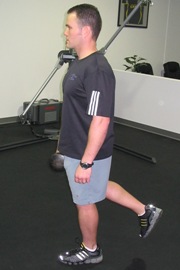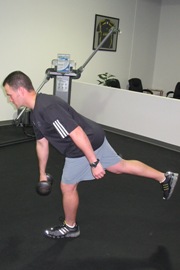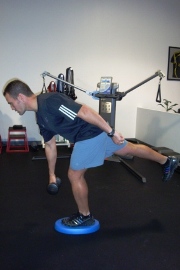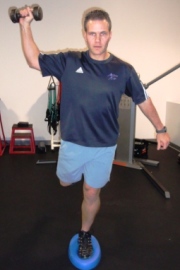Execution


Begin with a light to moderate dumbbell or kettlebell in the hand opposite the stance leg. Keeping the shoulder blades squeezed together, back flat, chest out and head up at all times, slowly bend forward at the hip until a comfortable stretch is felt in the hamstring.
Always maintain a slight degree of knee flexion to avoid hyperextension. Pause at the bottom, and repeat. Perform two to three sets of 10-12 reps.
Application
This exercise is an advanced version of the traditional RDL. It targets the hamstrings and glutes. I use it specifically to train balance, prevent and rehab proximal hamstring strains, increase hamstring to quadriceps strength ratios and improve running performance. Benefits include:
· Improved dynamic hamstring mobility
· Increased hamstring strength/power
· ACL injury prevention
· Enhanced single-leg balance/stability
· Reduced risk of hamstring strains
Progression
If this is too challenging initially, have your client hold a medicine ball or begin with a body bar to learn the single-leg form. To increase difficulty, you may choose one of the following:
· Perform the exercise on a flat Thera-Band pad (I do not recommend round, unstable surfaces).
· Perform an overhead diagonal PNF shoulder raise at the completion of the upward motion (you will likely need to use lighter weight to maintain form).
|
|
|
| Unstable RDL | Unstable RDL with PNF |
Brian Schiff, PT, CSCS (www.brianschiff.com) is a licensed physical therapist, respected author and fitness professional. He became a Certified Strength and Conditioning Specialist (CSCS) in 1998. In 2000, he opened his own personal training and sport specific conditioning facility, Fitness Edge, in


















